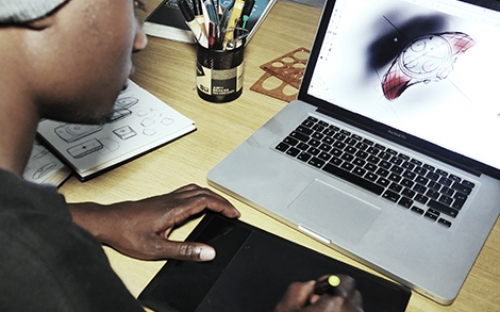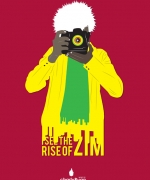Pioneering Industrial Design in Zimbabwe
You say industrial Design is unknown in Zimbabwe. Can you explain what it involves?
Well, at its most basic, Industrial Design involves the design of products that serve a particular function from concepts, manufacturing through to usage and disposal. What they call product lifecycle. It can be any product, your cellphone for example. At some point it was conceived and designed by someone. Industrial design was closely linked to mass produced consumer products but now it’s much broader.
So what kind of products do you want to design?
I would say that I’m inclined more to lifestyle products. Things that have an everyday use in people’s lifestyles. So right now I’m working on projects that span multiple categories from consumer electronics to furniture. I also have a passion for automotive and transportation and have a few projects on that but that’s a bit far off for now.
So what kind of skills do you need to be an Industrial Designer and how did you acquire them?
Industrial design involves creating products that people use. It is very different from design for print and has a lot of regulations with regard to safety and how people use products. It involves a lot of different skills for example engineering, materials science, manufacturing processes, ergonomics, psychology, technology, business, safety, environmental impact (which is a big issue now), Research & Development and of course the design aspect.
I trained as a graphic designer but at the end of the day I think that all the arts are linked at some point and that with the right knowledge you can leap from one field to another. It took me well over 6 years to acquire all the skills that I have now and It was especially difficult since I had to try and figure out most of the stuff on my own, and even now I still keep learning new things.
In other places where Industrial design is mainstream students get to learn from the very best in the industry and take internships at big companies like Apple, Samsung, Audi etc. That’s different in a place where Industrial design is almost unknown. But at the end of the day I think it gave me a very strong appreciation of the challenges that the profession poses and I think part of being a good designer is being able to overcome challenges.
Why Zimbabwe? Is it a sustainable business in a country like Zimbabwe. Where are the opportunities?
It’s funny that whenever I mentioned industrial design to a colleague or anyone, the first question I’d get was who will you offer the service to here in Zimbabwe? But in an age where the world is as connected, why should Zimbabwe be the limitation? Having said that, I think the biggest problem we face economically is that of competitiveness on the global market. You walk into a local appliance store and you see a locally made product next to another international brand and you can immediately tell the difference before you’ve even used the product. Zimbabwe has a fair number of good manufacturers with regard to function and quality, but when it comes to brand appeal and emotional connections there they’re found wanting.
This makes it especially difficult for companies to export or expand into other markets. Part of Veza’s goal will be to partner these local manufacturers to explore possibilities through design.
But you’re looking to raise 15k for a design studio. Is that really enough for such an ambitious project?
At the moment, the most important aspect is to have the basic, but vital equipment to start with. There is some basic equipment that at the end of the day you cannot do without. And that’s the goal of our campaign. From there on our projects will follow through on everything else.
Who is Tafadzwa Gutsa
I’m the first child in a family of three and grew up in different places around Zimbabwe. My father, who is late was constantly moving with work so I ended up moving between six or so schools during my childhood. I studied design at the Harare Polytechnic Art department and have worked in the advertising industry for a number of years. I’ve been working as an independent designer since 2011.
Why and how did you choose Industrial Design?
Before I even went to college I knew I wanted design and make stuff and I had a makeshift studio at home, but I dint know if that would actually turn out to be a career. A friend of mine at the time enrolled at the Harare Polytechnic and when I took my first tour of the art department I knew that was where I wanted to be. Even though we weren’t necessarily doing Industrial Design, I knew it would at least take me closer. The environment was good and I think the best thing there was that the lecturers really opened up our minds and eventually people ventured into different fields. Some became musicians, fashion designers, videographers and well some… I don’t know, but it was a platform for creatives to discover themselves.
Tell us about your recent venture - Veza Design
The word Veza is a shona term that means sculpt or craft. I thought it appropriate to name my studio that. It is a culmination of everything that I’ve been doing for the past few years. It is an industrial design studio that will be based here in Zimbabwe but will work to serve both local and international markets. I had a lot of inspiration form other industrial design firms like I.D.E.O, Fuse Project, Frog Design to mention a few.
How can Industrial Design improve the lives of the people in Zimbabwe or address social issues?
I think in any field, addressing social issues is a task that requires careful consideration and use of resources in defining what social issues need to be addressed and how they came to be. For me personally I see it from an economic point of view. As long as local companies and industries cannot compete and participate on the global platform, then there’s bound to be ripple effects socially. Companies begin cutting jobs and taking other cost cutting measures.
Industrial design is a piece of that puzzle and as it goes mainstream, we’ll see a lot of innovation coming through and local companies becoming more competitive. There’s a lot of energy around start-ups in Zimbabwe and that’s an exciting prospect.
What advise would you have for aspiring designers in Zimbabwe?
Just one. Explore. It is never just about what’s happening in Zimbabwe.
Where to next? What happens when you meet your goal on Indiegogo?
Well we’ve already embarked on a number of projects, and the goal of the campaign is to support that. I feel that with better resources we can have a faster and more sustainable design process.
At a latter stage, we also want to begin a process of converting already existing creatives in Zimbabwe to Industrial designers through various training programs and workshops.
What happens if you don’t meet your goal?
It would definitely slow down the pace but at the same time we will still have to go on with our vision.
And what is your vision?
To spark an industrial design revolution in Zimbabwe. I believe that if industrial design goes mainstream, there are a lot of opportunities to be realized for designers, local manufacturers and Zimbabwe.
Thanks Tafadzwa, and all the best with your campaign!
Tafadzwa Gutsa is an Independent design professional working in Zimbabwe and has recently founded Veza, an industrial design studio.
You can follow their campaign on: http://igg.me/at/vezadesign/x/10022384
Twitter: @veza_design Website: www.vezadesign.com





